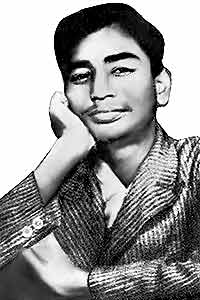 Sukanta Bhattacharya (August 15, 1926 - May 13, 1947) was a Bengali poet and playwright. Most of his compositions have been published posthumously. His poems were not circulated while he was alive. However post death his poems grew to such extent that he became one of the most popular Bengali poets of the 20th century. He has influenced poet Subhas Mukhopadhyay and composer Salil Chowdhury. His poetry is characterized by rebel socialist thoughts, patriotism, humanism and romanticism.
Sukanta Bhattacharya (August 15, 1926 - May 13, 1947) was a Bengali poet and playwright. Most of his compositions have been published posthumously. His poems were not circulated while he was alive. However post death his poems grew to such extent that he became one of the most popular Bengali poets of the 20th century. He has influenced poet Subhas Mukhopadhyay and composer Salil Chowdhury. His poetry is characterized by rebel socialist thoughts, patriotism, humanism and romanticism.
He was born on 15 August 1926. He spent his childhood at Nibedita Lane, Bagbazar. He did his schooling from Kamala Vidyamandir, a local primary school where his literary career started. His first short story was published in Sanchay that was a student magazine. `Vivekanander Jibani`, was published in Sikha. He joined the Communist Party of India in the year 1944. He edited an anthology called Akal. He was the editor of the Kishore Sabha. He died at a very young age of 20.
Literary Works of Sukanta Bhattacharya
His books were all published posthumously: Chharpatra, Ghum Nei, Purbabhas, Abhijan,
Mithe-Kadha and Giti Guccha. His works have a touch of communism. Sukanta Samagra (Complete Works of Sukanta) (1967) includes all the printed texts, some unpopular writings, plays and stories, which include Khudha, Durboddho, Bhadralok and Daradi Kishorer Svapna, an article, Chhanda O Abritti and also a collection of letters Patra Guchha. In his poem Chharpatra he refers to new-born babies.
Shukanta Bhattacarya was one of the best known among young poets that have left a permanent mark in Bengali literature. At such a young age he produced masterpieces.
He is titled as `young Nazrul`. He had an extra-ordinary capacity to express his emotions in writing. He was a venerable patriot. His poems speak a lot about the youth. The message in his poems is that young generation should not be neglected.
He is regarded as a pioneer among Marxist poets in Bengali. He wrote poems in the name of Lenin and for equality. He was concerned about human sufferings. He wrote poems in the names of Gandhi, Tagore, Langston Hughes and other humanists and international personalities. The message in his poems is instantly felt. He was a social activist, a poet and who composed many songs that convey the message of humanity across every section of society.













